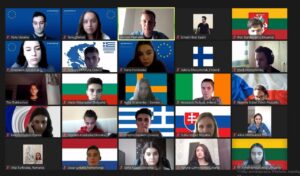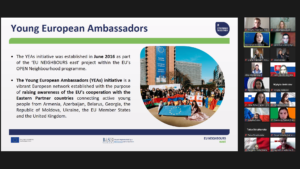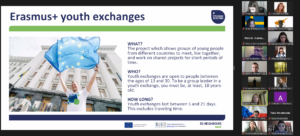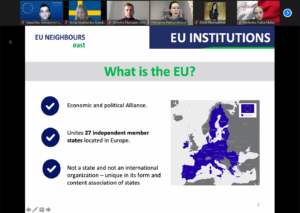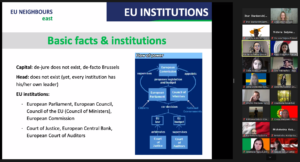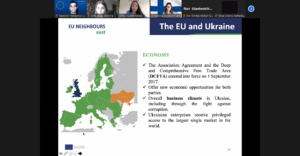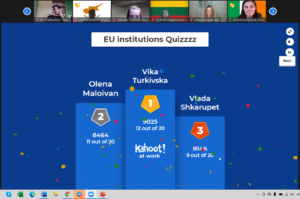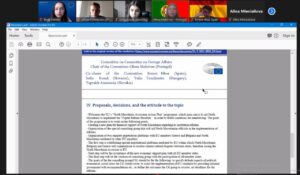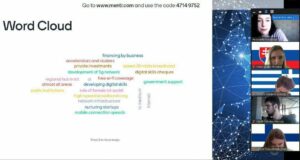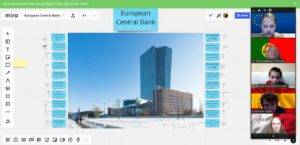
European Parliament Simulation: Learning by Doing
On 29-30 October 2021, more than 40 Ukrainian undergraduate students took part in the European Parliament Simulation event organised by the ‘Young European Ambassadors’ initiative in Ukraine. The event aimed to provide young people with insights regarding operating processes and functionality of the European Parliament and EU institutions overall, raise awareness of youth concerning European citizenship, help to develop soft skills (teamwork, drafting of documents, debating), and unite progressive young Ukrainians.
While working on the simulation concept, the organising team also considered feedback and format of the work from the first successful ‘Europe Day Model of the European Parliament’ event on 8-9 May 2021. The model was also carried out online and led by representatives of the ‘Young European Ambassadors’ initiative in Ukraine. You can find out more about it here.
The 40+ participants of the simulation represented different regions of Ukraine (Kyiv, Lviv, Kharkiv, Odesa, Severodonetsk, Sumy, Ternopil, Vynnytsia, Mariupol), while some Ukrainian undergraduates joined the event from abroad (Belgium and Slovakia). The majority of participants were students in international relations and political science. However, there were also students from law, economics, languages, business departments.
The European Parliament Simulation consisted out of two parts: theoretical and practical.
Honorable guests were invited for the welcoming speech and opening ceremony of the Simulation. One of them was Mrs. Victoria Davydova, Press and Information Advisor of the Delegation of the EU to Ukraine.
Mrs. Davydova stressed the EU’s support for progressive Ukrainian youth on a permanent basis, shared experience of her commitments within Delegation of EU to Ukraine, and highlighted opportunities that the EU Delegation provides for young Ukrainians.
The Team Leader of the EU Regional Communication Programme for the Eastern Neighborhood’ EU NEIGHBOURS east’, Mrs. Silvia Grant also addressed the event, highlighting the importance of actions like the European Parliament Simulation, and the insight provided on the functioning of EU institutions and the understanding of how decisions are adopted on the EU level.
The first day of the European Parliament Simulation (29 October) consisted of three lecture sessions from Ukrainian Young European Ambassadors:
- Kateryna Martyniuk delivered a session on the current state of affairs between the EU and Ukraine, the history and efforts behind the progress that we have accomplished so far, and what are the future expectations for EU-Ukraine relations;
- Marianna Fakhurdinova shared insights on the history of the EU overall, the areas of its activities and functioning of various EU institutions;
- Bohdana Mysyk shed light on the EU’s opportunities for young people, particularly for Ukrainian youth (volunteering, traineeships, exchange programmes, etc.).
The practical part of the European Parliament Simulation began during the last sessions of the first day when participants got familiar with the rules and instructions on how the working format would look on the second day.
The second day of the Simulation (30 October) included working group sessions where participants represented positions assigned for their countries on specific topics defined by the organising team in advance. They had a chance to debate, argue, and lobby their interests to get the most profitable resolution for their country. During these sessions, they were also developing their positions to draft resolutions that were presented on the last working window and voted for/against before the final voting.
The list of the topics that participants had a chance to focus on was the following:
- Digitalisation processes within the countries of EU and EaP (1st working group);
- Impact of disinformation and hate speech on the countries of the EU and EaP (2nd working group);
- Migration, Schengen and EU border policy developments within the EU (3rd working group);
- Erasmus+ and other EU youth actions (4th working group);
- Impact of EU Enlargement on the EU and countries of EaP (5th working group);
- Human rights challenges within the EU and EaP countries (6th working group).
Each working group had its mentor who was guiding and facilitating the workflow, answering any queries of the participants, and tracking time so that participants kept to the agenda of the 2nd working day. The mentors made a significant contribution towards a better understanding of the European Parliament processes by our participants. In addition, all the mentors were ‘Young European Ambassadors’ initiative representatives.
The following feedback from one of the event participants clearly outlines the dynamics of the working groups: “I’m grateful for the atmosphere and new knowledge. The best part of the project was teamwork when we had to be the ambassadors. By the way, it was an amazing experience to represent the country and connect the real political situation with your own idea. I understood better how the EU works.”
The second day ended with the final presentations of the results of the group working sessions and drafted resolutions. Participants had a chance for a short results presentation, two minutes for a Q&A session, and then voting took place for every presented resolution. Final voting on the summary resolution included five out of six proposals prepared by the working Committees (one proposal did not have enough votes to pass through) and was supported by every single member of the European Parliament Simulation.
Two interactive sessions also accelerated the event. A Kahoot quiz on knowledge of EU institutions took place on the first day of the Simulation. On the second day, participants had a chance to participate in the E-Miro board activity where they were provided with one EU institution and ten true and ten false facts about it. The task was to define which statements were correct and which ones were wrong. All the participants in the interactive formats received complimentary giveaways from the YEAs initiative.
All the participants of both days of the European Parliament Simulation received a certificate of participation and branded giveaways from the ‘Young European Ambassadors’ initiative in Ukraine. They also exchanged contacts for further potential cooperation and kept up communication in the Telegram chat that was created as a communication channel for the Simulation.
The organising team hopes to meet these talented young people during the next events organised by the ‘Young European Ambassadors’ initiative. Meantime, we would like to share some of the feedbacks from the participants of the event:
“It was one of the most unforgettable experiences of the events in which I participated. It gave me a lot of knowledge about what I’m really interested in, especially about the opportunities from the EU for youth. I also met new people, which is the most important thing. The speakers were also very nice, and the curators of the working groups. We did a great job together!”
“Regarding parliament simulation, all I can say is that it was wonderful experience. It makes you feel like you really are present at the EU Parliament and discussing important topics. This whole experience also helped to get to know some useful resources about EU members and how to search for information about them.”
“I was impressed by the Simulation. I also liked playing different games. It was an amazing atmosphere. That’s what I needed during the pandemic, when you are isolated. Thank you so much for this event, and I’m looking forward to meeting again.”
“A wide range of topics for discussion and further ‘decision-making’; interesting and thought-provoking lectures; well-planned and organised event in terms of online participation; opportunity to take part in certain type of Simulation adjacent to my specialisation at university; wonderful quizzes.”
“It was an amazing experience! I have learned a lot of new information about the European Union and these two days of meetings definitely exceeded all my expectations. Thank you so much! What I liked the most is communication in break out rooms and different games.”
LATEST

Building Europe: Poland’s experience of joining the European Union and lessons for Ukraine

World Health Day 2024: My Health, My Right

EUREKA MEETS EUROPE – opportunities to develop and study. My experience

Can you wear pink in the workplace?
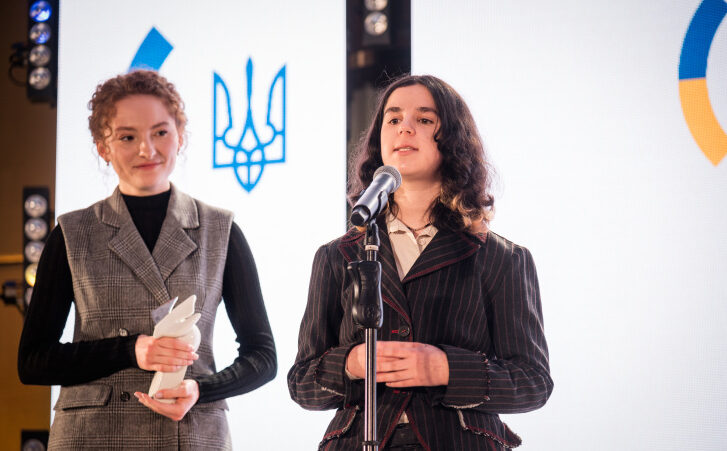
Go where your deepest fears lie: finding the courage to overcome gender barriers in STEM
More campaign pages:
Interested in the latest news and opportunities?
This website is managed by the EU-funded Regional Communication Programme for the Eastern Neighbourhood ('EU NEIGHBOURS east’), which complements and supports the communication of the Delegations of the European Union in the Eastern partner countries, and works under the guidance of the European Commission’s Directorate-General for Neighbourhood Policy and Enlargement Negotiations, and the European External Action Service. EU NEIGHBOURS east is implemented by a GOPA PACE-led consortium. It is part of the larger Neighbourhood Communication Programme (2020-2024) for the EU's Eastern and Southern Neighbourhood, which also includes 'EU NEIGHBOURS south’ project that runs the EU Neighbours portal.

The information on this site is subject to a Disclaimer and Protection of personal data. © European Union,
